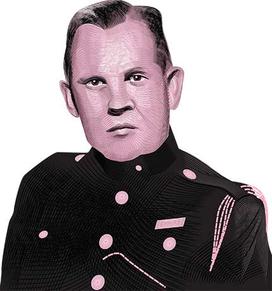Traveler, Scholar, Soldier, Spy
Princeton Portrait: William Alfred Eddy 1917 *1921 (1896–1962)

In June 1918, an exploding shell ripped apart the right side of William Eddy 1917 *1921, who was fighting with the Marines in a muddy wood in northern France. Thirteen operations later, Eddy was in such bad shape that the physician for a homebound ship tried to turn him away, saying, “He’ll never make it across the ocean.” The 6-foot Eddy weighed 108 pounds when he arrived in Brooklyn; he spent the next year in a naval hospital. He wrote to his father, “It is a real question what we will do after I leave the hospital (probably next fall) as you know I will be a cripple all my life. There will be something I can do, I know.”
After he left the hospital — with a limp he would keep for the rest of his life — Eddy returned to Princeton to become a scholar, earning a Ph.D. in literature with a dissertation on Gulliver’s Travels. Perhaps a specialty in travel literature was inevitable: The son of American missionaries in Syria, Eddy grew up speaking Arabic and learned at a young age how to move between worlds. After stints at the American University in Cairo and Dartmouth College, he became the president of Hobart and William Smith Colleges, one of 11 Princetonians who led universities at the time. He hated administrative work, however, and soon rejoined the military to escape it.
Eddy recalled that team members feared betrayal even by themselves: “Before the Allied landing on the coast of North Africa on Nov. 8, 1942, the handful of us who knew the date and place of the landings were terrified lest we might talk in our sleep.”
Eddy found a métier less politically hostile and murkily plotted than administration: spycraft. Some of his activities are still classified; we know that he helped to manage Research and Analysis, a branch of the Office of Strategic Services (OSS), the predecessor to the CIA, that employed university researchers. In 1941, he led an OSS team that quietly planned an invasion of North Africa should the United States join the Allies. “We had not then entered the war,” a journalist later said, “and until Dec. 7, 1941, Col. Eddy was doing things for which the Germans would have shot him, and properly could have done so under international law, if they had known of them.” Eddy recalled that team members feared betrayal even by themselves: “Before the Allied landing on the coast of North Africa on Nov. 8, 1942, the handful of us who knew the date and place of the landings were terrified lest we might talk in our sleep.”
In 1945, Eddy was the lone interpreter at a historic meeting, on a Navy ship in the Suez Canal, between President Franklin Roosevelt and King Ibn Saud of Saudi Arabia. Eddy interpreted differences of custom, as well: telling the king that his retinue must limit itself to a dozen worthies and servants; telling the president to “expect the party to double in size before the king embarked, because I knew what competition there would be among the princes and others to accompany the king”; directing the ship’s navigator to give the compass direction of Mecca at prayer hours; stopping sailors from walking on the deck between Mecca and the Muslims at prayer; and stopping civilians unfamiliar with Navy ships “from making coffee on charcoal burners over the dynamite.” Two of the king’s sons badgered Eddy into letting them sneak below decks at night to watch the scandalous Hollywood movies that the sailors screened.
The president, who was paralyzed, used a wheelchair while meeting the king; the king, who could not climb stairs due to an old injury, walked with assistance while meeting the president. Eddy, who once wondered what he could do given his own injury, noted in a memoir of the event that these two powerful men bonded over their handicaps. Roosevelt gave Ibn Saud one of his wheelchairs as a gift.
At the battle that almost killed Eddy, his sergeant, Dan Daly, shouted a line that is still famous today: “C’mon, you sons of bitches, do you want to live forever?” Though Eddy did not live forever, he managed to pack four or five lives into a single lifetime.











1 Response
Philip Seib ’70
4 Years AgoEddy’s Historic Moment
I enjoyed your article in the June issue about William Eddy 1917 *1921 (Princeton Portrait). His presence as translator and briefer at the 1945 meeting between President Franklin D. Roosevelt and Saudi King Abdul Aziz ibn Saud was important because of his fluency in Arabic and his understanding of the long-term stakes involved in the two countries’ relationship. The conversation between the president and the king in the Red Sea aboard the USS Murphy provided an early look at issues that were to shape Middle East politics for decades to come. An excellent biography of Eddy is Arabian Knight, by Thomas W. Lippman.